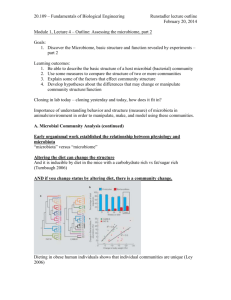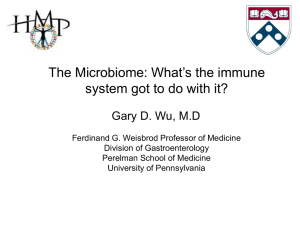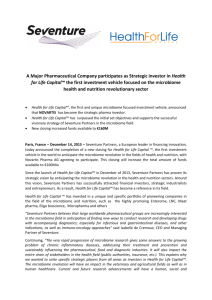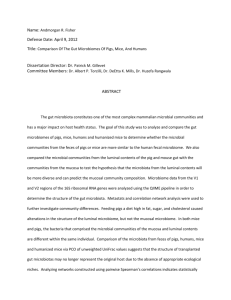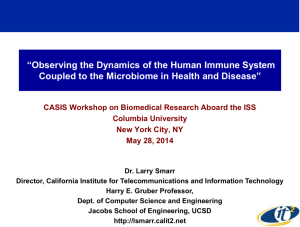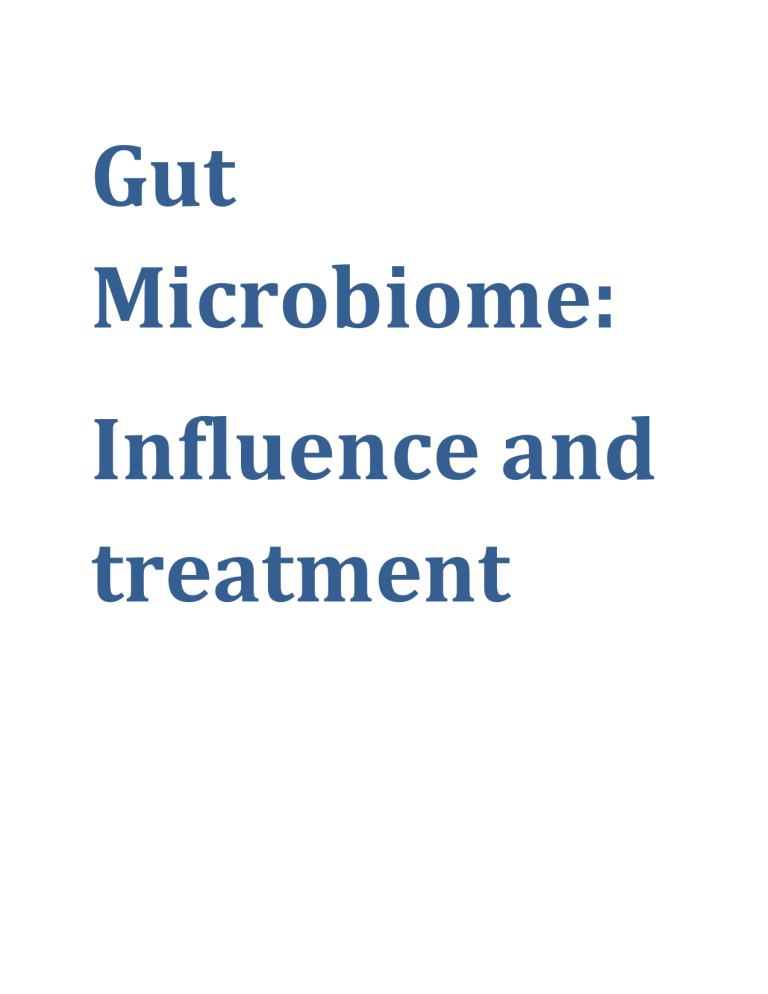
Gut Microbiome: Influence and treatment Index 1) What is Microbiome? 2) Functions of gut microbiome in human 3) Diseases caused by it’s imbalance 4) Faecal microbiota Treatment 5) Previous results and success 6) Bibliography Introduction The microbiome is a vast and diverse community of microorganisms that reside in and on the human body. It consists of trillions of bacteria, viruses, fungi, and other microbes that form a complex ecosystem. These microorganisms play a crucial role in maintaining our health and well-being. One of the most extensively studied microbiomes is the gut microbiome. It is located in the gastrointestinal tract and contains a wide variety of bacterial species. These bacteria aid in the digestion and absorption of nutrients, produce essential vitamins, and contribute to the development and function of the immune system. They also help in breaking down dietary fiber, which our own cells cannot digest, and produce short-chain fatty acids that have numerous health benefits. The composition of the microbiome is influenced by various factors, including genetics, diet, lifestyle, and environment. Disruptions in the balance of the microbiome, known as dysbiosis, have been associated with various health conditions, such as inflammatory bowel disease, obesity, allergies, and even mental health disorders. Functions of gut microbiome in human The gut microbiome performs several important functions, including: 1. Digestion and nutrient absorption: Certain microbes help break down complex carbohydrates, fibers, and other components of our diet that our bodies cannot digest on their own. 2. Immune system modulation [1]): The gut microbiome plays a vital role in the development and functioning of the immune system. It helps train the immune system to recognize and respond appropriately to pathogens 3. Protection against pathogens: The gut microbiome helps protect against harmful pathogens by competing for resources, producing antimicrobial compounds, and promoting the integrity of the intestinal lining. 4. Neurological function [2]: Emerging research suggests that the gut microbiome has a bidirectional communication with the central nervous system, known as the gut-brain axis. The microbes in the gut can produce neurotransmitters and other signaling molecules that can influence brain function, behavior, and even mental health. Disease caused by it’s imbalance An imbalance in the gut microbiome, known as dysbiosis, has been associated with various diseases and health conditions. 1) Gastrointestinal Disorders: Dysbiosis has been linked to conditions such as irritable bowel syndrome (IBS), inflammatory bowel disease (IBD), including Crohn's disease and ulcerative colitis, and gastrointestinal infections. 2) Metabolic Disorders: Dysbiosis has been associated with metabolic conditions such as obesity, type 2 diabetes, and non-alcoholic fatty liver disease. The gut microbiome influences energy extraction from the diet 3) Mental Health Disorders: The gut microbiome has been implicated in mental health conditions such as depression, anxiety, and even neurodevelopmental disorders like autism spectrum disorder. Dysbiosis may disrupt this communication, potentially contributing to mental health disturbances. 4) Allergies and Asthma: Dysbiosis in early life has been associated with an increased risk of developing allergies and asthma. The gut microbiome plays a role in immune system maturation and regulation. The gut microbiota is involved in the appearance of maternal IgA in milk due to its proximity with peyer’s patches [3]. Fecal Microbiota Transfer Fecal microbiota transfer (FMT), also known as fecal microbiota transplantation or stool transplant, is a medical procedure that involves transferring fecal matter from a healthy donor into the gastrointestinal tract of a recipient. The goal of FMT is to restore a healthy balance of gut bacteria and microbial diversity in the recipient's gut. FMT is primarily used as a treatment for recurrent Clostridium difficile infection (CDI), a bacterial infection that causes severe diarrhea and inflammation of the colon. CDI often occurs after antibiotic treatment, which disrupts the natural gut microbiota and allows C. difficile to overgrow. A medical procedure that should only be performed by trained healthcare professionals in appropriate clinical settings. It carries potential risks, including the transmission of infections or the introduction of unintended pathogens. Previous results and success 1) This method is proven for curing the well known clostridium difficile infection (CDI), which is recurring in many cases and it happens due to recent antibiotic use (as antibiotics disrupt the normal gut microbiota, allowing C. difficile to proliferate), advanced age, prolonged hospitalization and previous episodes of the disease. This disease is dangerous due to its high recurrent rate among the patients, about 60%. Due to very less success rate, FMT is used to cure the CDI. 2) In recent cases it has also been use to treat moderate to severe clinical depression patients. It was found effective in those cases and linked the direct connection of gut micro biome with the brain. To a surprise, those patients were also suffering from chronic constipation. Treatment 1) First a healthy fecal donor is donor is selected and Bibilography 1)Thomas C.A. Hitch, Lindsay J. Hall Microbiome-based interventions to modulate gut ecology and the immune system Mucosal Immunology (volume 15) 2) Rao, M., Gershon, M. The bowel and beyond: the enteric nervous system in neurological disorders 3) Usami et al., 2021, Cell Reports 36, 109655(milk in colostrum)

